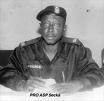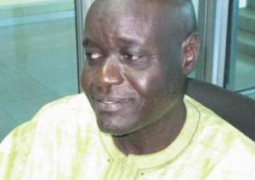
Senior security officers from the police, immigration, prisons, army, navy and NIA have been urged to enforce the Prohibition of Smoking (Public Places) Act 1998. The Act provides for the prohibition of the smoking of tobacco in public places.
Sambujang Conteh Director of RAID Gambia made this call yesterday at the Police headquarters in Banjul during a meeting with senior security officers on the enforcement of the Act which bans smoking in public places, since it was enacted by the National Assembly and assented to by the President in 1998. The aim of the forum was to sensitise the security apparatus on the need for vigorous enforcement of the Act.
"Today is a very important day for us as anti-tobacco campaigners," Mr. Conteh said when addressing the meeting.
"Since 25th July 1998 the Gambian National Assembly has passed the bill, which forbids smoking in public places, and this was assented to by the President on the 23rd September 1998."
He said, prior to that, his organisation engaged in a lot of consultations, until the WHO framework convention on Tobacco control (FCTC) came in.
He said the National Assembly of The Gambia ratified the convention on 5th June 2007 without any reservations, and endorsed by the President in October 2007.
"The WHO office, Ministry of Health and Social Welfare and the National Assembly sub-contracted my agency to transmit the WHO Framework Convention on Tobacco Control, FCTC, to Gambians.
"We organised 43 consultative forums across the country and each forum brought together 30 participants from a cross-section of society, including women, men, youths and opinion leaders," he added.
After the completion of community consultations conducted by RAID Gambia, there were five key conclusions or recommendations made.
These included the following: an increase in taxation over 100% on the importation of all tobacco products; enforcement of the No Smoking in Public Places Act; to impose a ban on the sale of tobacco to children or minors; to create a Tobacco Control Program or National Tobacco Control Unit; and, to launch an intensive anti-tobacco control campaign.
Mr. Conteh described his meeting with senior security officers as another milestone in the history of the Gambia?s anti- tobacco programme, stressing further that the role of the security personnel is to protect the country, its people and their properties.
"Your role as security personnel is very important, and no Act can be enforced in the absence of the security personnel," he added.
According to Mr. Conteh, even though tobacco companies could be paying millions in taxes, any amount the government receives from tobacco companies is doubled by public expenditure to cure tobacco-related illness.
He said his agency will continue to struggle until The Gambia is free from tobacco, drugs and substance abuse, while appealing to the government to increase the taxation on tobacco, as recommended by the Gambian people.
The Inspector General of Police was represented by his personal assistant, Commissioner Ebrima Bah, who described smoking as a health hazard.
Commissioner Bah told security officers that the Act must be enforced to the letter, adding that the importance of such forums cannot be overemphasised, given the role security officers play in the society.
Yerro Bah the focal person on Tobacco at the Health Education Unit of the Health Ministry in Banjul also spoke at the meeting, and gave details of the WHO Framework Convention on Tobacco Control.
Mr. Bah urged security officers to enforce the Act as tobacco poses a serious threat to mankind, noting that it affects not only the smoker but also others around the individual smoking.
Meanwhile, a new health warning to be carried on all cigarette packs sold in The Gambia with effect from 1st October 2010 has been issued by public officials, and come that date all cigarette packs are required to bear health warning. According to them, failure to comply will result in prosecution.
Police Public Relations Officer Superintendent Sulayman Secka chaired the meeting.


